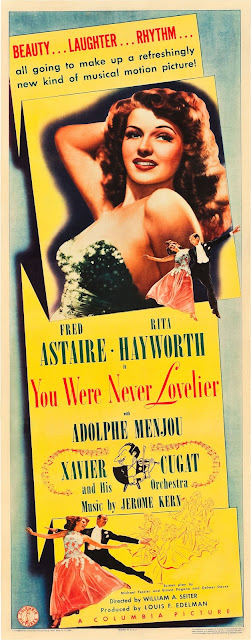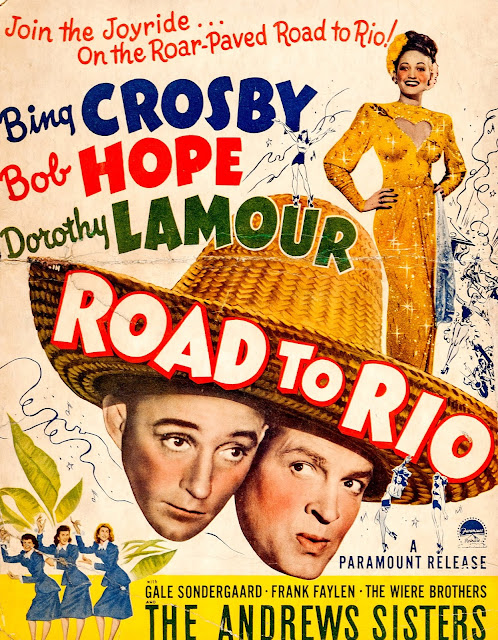For the past twenty minutes, I've been bawling my eyes out. I've seen 1954's
A Star is Born a handful of times, but the ending never fails to tear me to pieces. Every time, I ask the screen "Please, can everything just work out this go-around?" and every time it doesn't happen. The sacrifice of James Mason's Norman Maine and the pain of Judy Garland's Esther Blodgett have been imprinted on my brain ever since my first viewing of the film almost a decade ago, yet each time I see it again, the heartbreak and the tears come as if I've never seen it before.
A Star is Born has one of the richest and most complex production histories. That statement applies to both the 1954 film and the material in general (which we will once again see on the big screen
next year!).
I don't want to talk about that, though. What I want to discuss is the beautiful, heart-stopping performance of Ms. Judy Garland. With the role of Esther, Judy was able to showcase all of the qualities that made her an unforgettable star: the crushing vulnerability, the delicious humor, the toughness that came out of necessity more than choice. She is at once the silly vaudevillian, the breathtaking actress, and the exquisite vocalist. With each scene, you think that she couldn't possibly get any better... and then she does.
There are many parallels to be found between
A Star is Born and Judy. In her life, she embodied not only Esther, but Norman as well. Show business turned Frances Gumm, Esther Blodgett, and Ernest Gubbins into Judy Garland, Vicki Lester, and Norman Maine, entertainers who underwent enormous tragedies at the price of fame. Self-destructive and washed up, Norman is no longer the great star he used to be. Booze-filled nights appear to be the only thing that he has left to live for, until he finds a purpose again: helping Esther. With her dependency on pills, Judy became very similar to Norman. She would be unreliable and seemed to sabotage herself at every turn.
One of the most honestly real scenes in the film is when Esther is talking to friend and former boss Oliver Niles (Charles Bickford) about Norman's alcoholism. It is shattering to watch Esther crumble before our very eyes as she admits the hatred she feels towards her husband for failing to recover. You have to wonder if Judy felt the same way, if she hated herself for never quite getting better. After this gut-wrenching confession, Esther must go back on set and instantly jump back into an upbeat number. How many times did Judy have to push aside awful personal circumstances to give her audiences incredible performances?
Near the beginning of the narrative, Esther tells Norman "I somehow feel most alive when I'm singing." She struggles to explain just what singing means to her, but after witnessing her explosive performance of
"The Man That Got Away," we understand that no words could ever quite describe it. For Esther and the woman playing her, singing isn't just an expression, it is an extension of the self. When you hear Judy, you're hearing her agony, her joy, and her sadness -- she was incapable of being anything other than authentic.
Growing up at MGM alongside such beauties as Elizabeth Taylor and Lana Turner made Judy's insecurities worse. She felt hideous and unlovable compared to them, yet no one else captured people's hearts like Judy did.
The moment where Esther is made unrecognizable by the studio feels really poignant to me. After a few hours in the make-up chair, she doubts everything. Norman takes one look at her and immediately restores her back to the Esther we love, telling her "Your face is just dandy!" I like to imagine that this scene was retribution for Judy, that Norman was an audience surrogate assuring Judy that we adore her for exactly who she was.
While the whole film is magnificent, I must admit that my favorite scene is when Norman proposes to Esther. She is recording a song, but when the orchestra takes over, she rushes over to Norman, who has been watching her lovingly. We can't hear their conversation because the music is too loud, but when the song is played back, Norman and Esther are surprised to hear their voices -- a sound technician had pushed a microphone towards them!
I love watching Mason and Garland in this scene. They are so playful and cute together, making the loss all the more profound at film's end. Their recorded conversation is amazing, too, not because it's romantic, but because it shows that Esther recognizes Norman's faults. She isn't exactly a wide-eyed innocent, so when she accepts his proposal, she is demonstrating a leap of faith. It's such a well-executed scene. You can admire it
here.
After Norman's suicide, Esther isolates herself. The confrontation between her and her friend Danny (Tommy Noonan) is difficult to watch. She wants to hold onto her grief the way Norman held onto the bottle, but Danny refuses to let her. The one thing Norman was proud of was his wife and her career. If she didn't go on, she would be disrespecting that. Realizing that Danny is right, Esther goes to a benefit she had committed to, the same benefit where she had met Norman. The memories of the place are almost too much for her, but when she takes to the stage, we know Esther will be okay. She will be a survivor. In the end, I think Judy was, too.
__________________
This is my first contribution to the Judy Garland Blogathon. Celebrate the brilliant woman by checking out the other entries
here.























Wonderful post! I've never actually seen any of the various versions of A Star Is Born (I know, I know), but I definitely want to watch this one now. It sounds like a real tearjerker.
ReplyDeleteThank you! It's a rough film to watch, but it's also gorgeous and sweet and romantic. Obviously, I love it, haha.
DeleteThe only other version I've seen is the 1937 one, but it didn't make much of an impression on me. I think it's because I thought it had been colorized and I'm extremely against colorization.
Many people say that A Star is Born is based on 1932's What Price Hollywood? After reading that film's synopsis, they do sound really similar...
Terrific review! Judy and Sid and everyone else really put their hearts and souls into "A Star Is Born." I think history's vindicated them--ten to one, more people remember this film than "The Country Girl," even though the latter got the Oscar. Love this film. :-)
ReplyDeleteThank you! I agree, you can see a lot of care and thought went into this film. I'm so glad it was restored, even though they had to replace footage with photos.
DeleteBeautiful post. This is such a sad film. Judy is incredible in this. The final few scenes are very sad indeed. I always feel sorry for Norman, as he felt he had no other choice than to do what he does; he thinks she will be better off without him when the opposite is true. A very moving look at love, pain and how fleeting fame can be. Maddy
ReplyDeleteThank you! Norman's sacrifice is heartbreaking, isn't it? Their last scene together is so moving and sad, especially since he has already decided what he's going to do. Such a lovely, tragic film.
DeleteHi Michaela. That was great. You made many good observations. "Please, can everything just work out this go-around?" I'm glad I'm not the only person who says that while watching familiar movies. I had not thought about Judy having so many features of both Esther and Norman.
ReplyDeleteThank you! I hadn't thought about the similarities either until I was watching the film for this post. It's easy to see why Judy was drawn to this material -- it made for an ideal comeback, and she could connect to it personally.
DeleteSuch a beautiful, moving tribute, Michaela. I thought Esther's transformation was actually a reversal of Judy's own. A lot kinder. But man, she really was so vulnerable and channeled that into strength for the role.
ReplyDeleteThank you! Judy was just brilliant, wasn't she? She deserved so much more than what she got, as her role in this film demonstrates.
DeleteWhat a powerful and beautiful tribute! A Star is Born was the quintessential Judy movie when I was a teen and first fell in love with her. So many years later, my sister still can't listen to the soundtrack 'cause I had it on repeat. Judy delivers a performances for the ages. No offense to Grace Kelly, but it really was a shame Garland lost the Oscar.
ReplyDeleteThank you! I feel the same way. I don't mean to take anything away from Grace Kelly, but Judy's performance never fails to move me. I'm so sad for her that she didn't win.
DeleteThis post was so beautiful! I loved this sentence: "With each scene, you think that she couldn't possibly get any better... and then she does."
ReplyDeleteThe film is heartbreaking, authentic, fascinating. I sw the 1937 version first, and the use of color in it made this film my all-time favorite, but the 1954 version is also dear to my heart.
Kisses!
Le
Thank you! I'm going to have to give the 1937 version another chance, clearly!
Delete